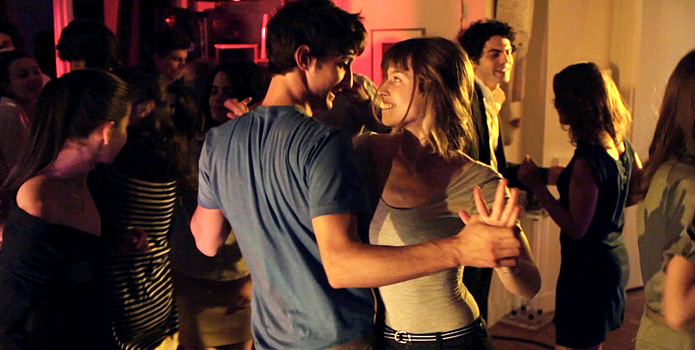 PIERRE NINEY IN 18 YEARS OLD AND RISINGClass comedy
PIERRE NINEY IN 18 YEARS OLD AND RISINGClass comedyFrédéric Louf's smart political comedy about the Upper Bourgeoisie in the time of Mitterand skewers both snobby rich kids and the working class boy who sets out to enjoy them and then falls for a self-centered girl. The laughs are physical as well as witty and dominated by the Comédie-Française's skinny, nimble, talented youngest male member Pierre Niney as Primo Bramsi, a supposed school failure with dash who despises his provincial florist father and neglects to pay the rent on his tiny Parisian
chambre de bonne -- but keeps bouncing back and surprises his prof by passing his
bac.
Primo isn't political. He's a free-wheeling, picaresque character, almost a Felix Krull, who will say anything to get ahead. Watching him improvise is a giddy pleasure. Coming back to Paris after a short, disastrous visit to his parents, he crashes a party given by some snobby rich Parisian kids and though his shoes fall apart, the girls fall for him. He falls hopelessly for the insufferably self-centered Gabrielle (Lou de Laâge ), though it's the quirky Delphone (Audrey Bastien) who may want him the most. Gabrielle does invite Primo to summer with her and her family in Saint-Tropez, but she quickly disinvites him when he gets beaten up by some right wing toughs and the bruises on his face make him look like a raccoon. Appearances are everything for these silly young snobs.
Louf, who co-wrote (with Régis Jaulin) and directed this debut romantic farce, heightens the sociopolitical emphasis by setting its events in 1981 when the socialist François Mitterand is just getting elected President, beginning a 13-year period when the communists were invited into the government and the right wing was in a continual state of alarm and outrage. Primo's pal at his building is a young Arab with natural leftist leadings called Malik (Ali Marhyar) who has told him to vote for Mitterand, but that never happens, though Primo's friendship with Malik survives his flirtations with the pampered rich.
After being banished by Gabrielle, Primo is invited back by Gabrielle's rich boyfriend to a wine party for which Primo blows all his rent money, 1800 francs, for a bottle that will impress her friends -- he gets a 1961 Chateau La Conseillante, which is worth $2,700 today. But when Malik is shocked at this waste Primo opens the bottle and drinks it with Malik up on the roof, later refilling the bottle with 10-franc plonk from the supermarket to take to the party. The rich boys know it's not La Conseillante because Malik threw away the cork, but are fooled into thinking it's good stuff.
Part of the fun of
18 Years Old and Rising is the way Primo keeps getting away with everything: it's a celebration of the durability and sociopolitical flexibility of youth, and Niney (who has a droll cameo in Guédiguian's new film, also in the Rendez-Vous,
The Snows of Kilimanjaro), seems made of shape-holding rubber. His character jumps into fistfights at a moment's notice and often threatens to jump out of windows, which he occasionally makes good on. He accordingly spends much screen time all bruised or limping. But the real victims are the rich kids whose received prejudices are continually skewered. Miraculously and rather inexplicably, Primo passes his
bac and his philosophy prof stands him to a bottle of good champagne. Both of the rich girls still seem to like him, his Arab friend doesn't hate him and the rich boys keep looking sillier and sillier. If you're leanings are anti-youth or pro-money, none of this is going to taste very sweet.
The combination of politics, history, and romantic comedy is reminiscent of last year's French US art house hit, Michel Leclerc's
The Names of Love, which substitutes for the victorious Mitterand the defeated Lionel Jospin and is set twenty years later and whose nimble comic is a female one, Sara Forestier. Leclerc's film is more layered, but Louf's is purer, simpler fun.
Première compares Niney to Louis Garrel, and he does resemble Garrel's more madcap, crazy side, only skinnier. Niney was nominated for the Jeune Espoir Masculin (Most Promising Male Actor) award at the 2012 Césars for this performance.
Suiting its wild summer mood,
J'aime regarder les filles opened in Paris July 20, 2011 to fair reviews (Allociné 2.9): some didn't get the joke. The film has also aired at several festivals, including Toronto in September 2011.
The French title is taken from Patrick Coutin's 1981 hit. The film is included in the March 1-11, 2012 joint UniFrance and Film Society of Lincoln Center series, Rendez-Vous with French Cinema. Public screenings will be:
Mon., March 5, 6pm – IFC; *Sat., March 10, 3:45pm - WRT
*In person: Frédéric Louf




